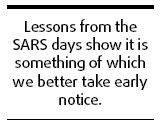Challenge of swine flu
As was true during the 2003 SARS (severe acute respiratory symptom) onslaught, we find ourselves in the dark about the mysterious virus - this time swine influenza A/H1N1.
The only thing we know for sure at this point about swine flu is we know too little about it. The World Health Organisation has declared a "public health emergency of international concern," yet not decided whether to increase its pandemic phase from the current 3 to 4.
Phase 3 refers to sporadic cases of infection. Phase 4 means community-level outbreaks.
Outside of Mexico, infections reported so far are sporadic. But we are not sure if "sporadic" is sufficient should more of the 100-plus deaths in Mexico is confirmed to be the result of swine flu.
There is no reason to panic. Which does no good except brewing a contagious hysteria.
With the epicenter a hemisphere away, few in this country see a clear and present danger. Yet that is exactly where the real danger lies. With the world's top brains in the field undecided about the possibility of the feared global pandemic, it is extremely difficult to tell how safe we actually are. Even WHO confessed to "gaps in knowledge about the clinical features, epidemiology, and virology of reported cases and the appropriate responses."
The most challenging task now is to respond appropriately.

There is no need to overreact, but inaction would be intolerable. To date, there have been dozens of suspected infections reported from outside of Mexico. Which reveals a worrisome path for the virus' dissemination. There were confirmed cases of infection via public transport during the SARS epidemic.
How many people have traveled to and from Mexico recently? Passenger flow between these two countries is obviously larger than in 2003.
Then how do we respond? WHO has asked all countries to "intensify surveillance for unusual outbreaks of influenza-like illness and severe pneumonia." It is yet to announce travel alert and higher response requirements. Our Ministry of Foreign Affairs has issued a travel advisory. Public health authorities have published suggestions for self-protection. And, a ban on pork imports from the epidemic areas has been announced.
Another emergent imperative is border quarantine. Judging from the pattern of the virus' spread, that could be the best way to keep the epidemic from invading.
Monitoring international passenger flow may be difficult. And excessive precautionary measures at airports may discourage some from flying - the last thing our loss-making airlines want to see these days.
But lessons from the SARS days show it is something of which we better take early notice. It would be too late if we wait to be told to raise our level of preparedness.
(China Daily 04/28/2009 page8)








